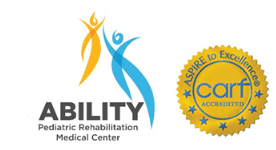Developing the skills to deal with disorders
Clinical Psychologists play a pivotal role in improving the lives of children facing various mental health challenges. We employ evidence-based interventions, therapeutic techniques, and a compassionate approach to provide tailored care for young individuals struggling with disorders such as ADHD, Anxiety, Depression, and Autism Spectrum Disorders. Through ongoing education and dedication to understanding the unique needs of children, our Clinical Psychologists empower families and caregivers to navigate the complexities of childhood disorders, fostering resilience and a brighter future for these young individuals.

Emotional Regulation.
Social Skills.
Coping Strategies.
Problem-Solving Skills.
Cognitive Skills.
Self-Esteem and Self-Confidence.
Stress Management & Distress Tolerance.
Our Approach
Ability Pediatric Rehabilitation Medical Center in Abu Dhabi can help children with their cognitive, emotional and social skills, alongside managing mood disorders such as anxiety and depression. Treatment includes Cognitive Behavioral Therapy (CBT), Mindfulness, Behavior Therapy and Parental Counselling.
FAQ'S
Clinical Psychology is a field of psychology that focuses on diagnosing and treating mental and emotional disorders. It involves assessing, understanding, and providing therapy to individuals (both children and adults) dealing with psychological issues. Clinical Psychologists often work in a variety of settings including hospitals, private practices and mental health clinics.
The specialty of Clinical Psychology addresses behavioral and mental health issues faced by individuals across their lifespan. These include intellectual, emotional, psychological, social and behavioral maladjustments. The science of Psychology is leveraged to treat complex human issues and promote change, in addition to resilience which helps people discover their strengths.
Timely consultation with a clinical psychologist is paramount when a child displays noticeable and persistent behavioral or emotional changes that impact their daily functioning. These changes may include prolonged feelings of sadness, excessive worry, or anxiety, impulsively or aggression or academic difficulties. In cases of trauma such as abuse, loss, or significant life events professional intervention from a clinical psychologist is crucial. Additionally, if developmental delays, learning challenges, social difficulties like poor socio-emotional reciprocity, lack of social skills are observed, the expertise of a clinical psychologist can provide comprehensive assessments and evidence-based interventions to cater these challenges.
Assessing whether therapy is warranted for a 3-year-old involves recognizing specific behavioral indicators. These may encompass severe tantrums, consistent defiance of instructions, or experiencing difficulties at school or in social settings. If a child's behavior significantly disrupts family life or raises concerns about potential harm to others, seeking professional intervention is advisable.
Signs of ADHD
• Frequent difficulty sustaining attention on tasks. Making careless mistakes when organizing an activity.
• Excessive fidgeting, restlessness and impulsivity. Frequently interrupting others especially parents and peers.
• Frequently losing or forgetting essential items and tasks.
• Struggling with academic tasks, following instructions and completing assignments.
• Difficulty maintaining relationships with peers due to impulsive or disruptive behavior.
<Signs of ASD
• Difficulty engaging with others, including making eye contact, sharing interests, or understanding social cues.
• Engaging in repetitive movements such as ritualistic-like hand flapping or echolalia.
• Limited speech development when initiating or maintaining conversation, or using language inappropriately.
• Strong aversion to changes in routines or environment.
• Intense focus on specific topics or objects while showing limited interest in other activities.
Signs of Childhood Depression
• A prolonged, unexplained feeling of unhappiness and low mood.
• Disinterested in previously enjoyed activities and hobbies.
• Disturbed sleep (either excessive or insufficient) and noticeable changes in appetite.
• Unexplained physical and mental exhaustion.
• Frequent self-criticism, feeling of worthlessness and thoughts of self-harm or suicide.
Signs of Learning Disability
• Consistent difficulty with reading, writing, math, or another specific subjects.
• Trouble in retaining information, following instructions, remembering assignments or academic related activities.
• Falling behind peers' academic milestones despite consistent effort.
• Difficulty managing time, materials, or tasks.
• Expressing frustration, anxiety, or avoidance behavior while facing academic challenges.
• Frequent difficulty sustaining attention on tasks. Making careless mistakes when organizing an activity.
• Excessive fidgeting, restlessness and impulsivity. Frequently interrupting others especially parents and peers.
• Frequently losing or forgetting essential items and tasks.
• Struggling with academic tasks, following instructions and completing assignments.
• Difficulty maintaining relationships with peers due to impulsive or disruptive behavior.
<Signs of ASD
• Difficulty engaging with others, including making eye contact, sharing interests, or understanding social cues.
• Engaging in repetitive movements such as ritualistic-like hand flapping or echolalia.
• Limited speech development when initiating or maintaining conversation, or using language inappropriately.
• Strong aversion to changes in routines or environment.
• Intense focus on specific topics or objects while showing limited interest in other activities.
Signs of Childhood Depression
• A prolonged, unexplained feeling of unhappiness and low mood.
• Disinterested in previously enjoyed activities and hobbies.
• Disturbed sleep (either excessive or insufficient) and noticeable changes in appetite.
• Unexplained physical and mental exhaustion.
• Frequent self-criticism, feeling of worthlessness and thoughts of self-harm or suicide.
Signs of Learning Disability
• Consistent difficulty with reading, writing, math, or another specific subjects.
• Trouble in retaining information, following instructions, remembering assignments or academic related activities.
• Falling behind peers' academic milestones despite consistent effort.
• Difficulty managing time, materials, or tasks.
• Expressing frustration, anxiety, or avoidance behavior while facing academic challenges.







